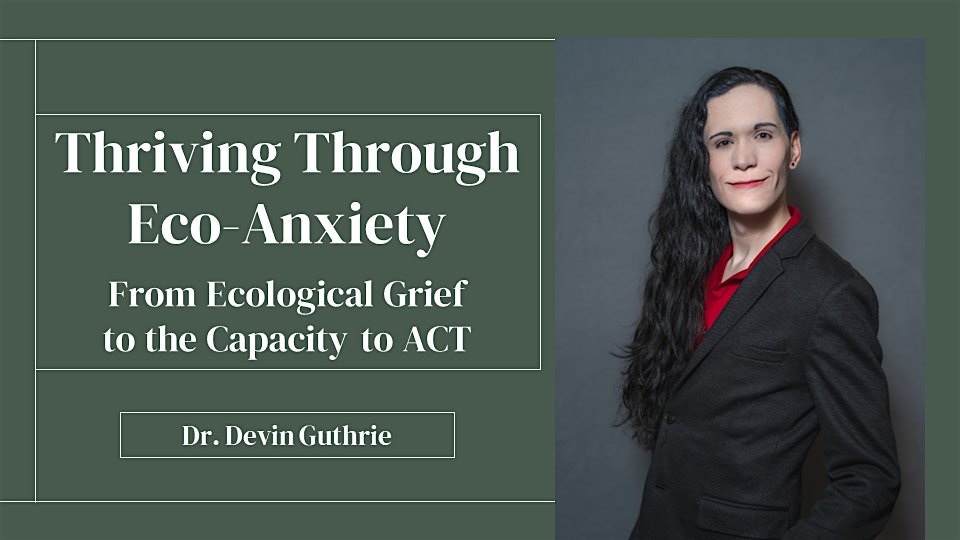Please be sure to check the event organizer’s website for any last-minute changes or cancellations prior to attending.
Have an event that will fit well on our calendar?

- This event has passed.
Thriving Through Eco-Anxiety: From Ecological Grief to the Capacity to ACT

As climate crisis intensifies, eco-anxiety (i.e., distress and dysfunction that accompany awareness of climate crisis) is quickly becoming the major mental health crisis of the modern era. Eco-anxiety is notoriously difficult to treat, both because it is founded in rational fears and because the grief, rage, panic, and powerlessness people experience when considering climate crisis can be overwhelming, both for clients and the professionals who work with them. This experiential and skills-building workshop will explain eco-anxiety in two contexts crucial for fostering resilience: death anxiety and anticipatory grief. Using an Acceptance and Commitment Therapy (ACT) framework, participating practitioners will learn to guide clients through the process of accepting their anxiety and working through their grief. We will discuss personal/professional experiences with eco-anxiety, learn to flip the script on eco-anxious thoughts, and identify values and goals that would be workable even in the face of eco-anxiety’s scariest narrative: human extinction. Once integrated, eco-anxiety can become an empowering force, inspiring us to make more meaningful choices and live more fulfilling lives, even in the context of an ongoing existential threat.
About the Presenter:
Devin Guthrie, Ph.D. is an existential psychologist whose research aims to find better ways to treat eco-anxiety, death anxiety, improve end-of-life care, and promote meaning in life. They also practice as a life and death coach, helping clients live with physical, mental, and existential pain.
Learning Objectives:
· Explain the relationship between eco-anxiety, death anxiety, and psychological flexibility as well as the life-enhancing (acceptance-based) and life-limiting (avoidance-based) trajectories of eco-anxiety.
· Identify and explore values and goals that are resilient to the threats posed by climate crisis.
· Implement at least 2 ACT interventions for addressing eco-anxiety.
Bonus Activity: Following the training on Eco-Anxiety (10am-1pm), we will take a short break and are excited to host an optional 1-hour mindfulness training (1:30pm-2:30pm): Mindful Movement for Climate Resilience, led by Oana Nechita, MA, LPC, RYT. This is an embodied invitation to honor, open to, and move through our collective pain for the natural world. This will include self-regulatory practices (breath, chanting) and gentle, trauma-conscious somatic practices accessible to all. Together, we hope to co-create a heart-supporting space to hold and process our collective grief. (Note: if you are planning to attend this portion of the training, please bring a yoga mat or towel if you have one)
Disclosure of Conflict of Interest:
The presenters have no conflicts of interest to declare.
Cancellation Policy:
To receive a full refund, a written request must be received before September 22. After September 22, $25 will be deducted from refunds for professionals and $15 will be deducted from students. Refunds will be processed within 5 days.
Intended Audience:
Audience for which this program is intended includes psychologists, clinical social workers, professional counselors, marriage and family therapists, certified alcohol & drug counselors, and students in related fields.
CE Information:
3 CE’s are available for complete attendance of the eco-anxiety portion of the training led by Devin Guthrie (10am-1pm).
The Association for Contextual Behavioral Science is approved by the American Psychological Association to sponsor continuing education for psychologists. The Association for Contextual Behavioral Science maintains responsibility for this program and its content.
To the best of our knowledge, the below State Boards accept continuing education credits for programs approved by APA. Please confirm with your licensing board to confirm eligibility. PA State Board of Social Workers; PA State Board of Licensed Professional Counselors; PA State Board of Marriage and Family Therapists; NJ Board of Licensed Professional Counselors; NJ Board of Marriage and Family Therapy Examiners; DE Board of Social Work Examiners; and DE Board of Professional Counselors of Mental Health.
Details
- Date: October 5, 2024
-
Time:
10:00 am - 2:30 pm
- Website: https://www.eventbrite.com/e/thriving-through-eco-anxiety-from-ecological-grief-to-the-capacity-to-act-tickets-970532527917
Venue
- La Salle University
-
1900 West Olney Avenue
Philadelphia, PA 19141 United States

